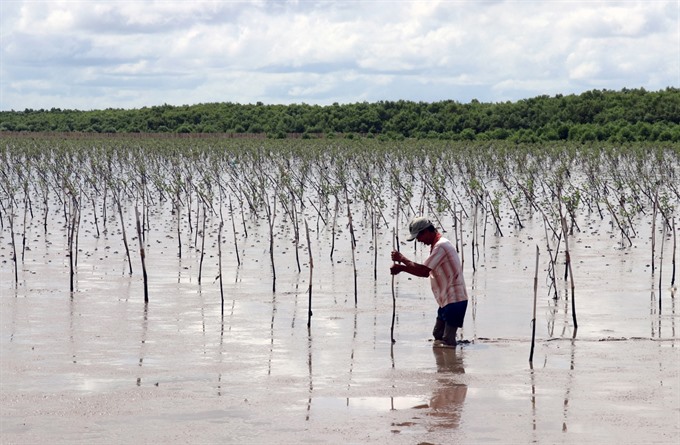

A landmark UN report on the impacts of global warming was shared in Việt Nam on Wednesday.
 |
| Mangroves are being planted in the coastal district of An Biên in the Mekong Delta Province Kiên Giang to fight off erosion and salt intrusion -- negative phenomena exacerbated by climate change. — VNA/VNS Photo Lê Huy Hải |
HÀ NỘI — A landmark UN report on the impacts of global warming was shared in Việt Nam on Wednesday.
The study details the effects of climate change of 1.5 degrees Celsius over pre-industrial levels.
The report has already been approved by 195 countries earlier this month in South Korea.
The report, distilled from more than 6,000 scientific studies, was prepared by the United Nations science body Intergovernmental Panel for Climate Change (IPCC) under requests from countries that signed the Paris Agreement in 2015. It looked into how the global climate would differ from a temperature rise of 1.5°C instead of the previously goal of 2°C.
According to the report, climate change could be much less catastrophic if the temperature rise is capped at 1.5°C. The sea level rise by 2100, for example, will be lower than 10cm in case of a temperature rise of 1.5°C as compared to a 2°C rise. The half-degree difference could also save corals from complete eradication and ease the chance of summer ice melting in the Artic by at least 10 times.
“One of the key messages that comes out very strongly from this report is that we are already seeing the consequences of 1°C of global warming through more extreme weather, rising sea levels and diminishing Arctic sea ice, among other changes,” said Panmao Zhai, Co-Chair of IPCC Working Group I at the High-level Dialogue on Climate Change organised by the IPCC, the United Nations Development Programme (UNDP) and the Ministry of Natural Resources and Environment in Hà Nội on Wednesday.
At the current rate of temperature rise, the world is likely to reach the 1.5°C threshold between 2030 and 2052, he added.
But there was still time to prevent the world from getting hotter than 1.5°C, the report said. Accordingly, we have to cut greenhouse gas emissions by 45 per cent by 2030 compared to the total in 2010, then reduced to zero by 2050.
This would demand rapid, comprehensive and unprecedented changes in all aspects of the society, said IPCC chairman Hoesung Lee at the dialogue.
‘Cost of inaction’
Việt Nam is one of the countries most affected by climate change. Việt Nam Panel on Climate Change deputy chairman Trần Thục reported the country’s temperature on average rose by 0.62°C from 1985 to 2014. The number of hot days increased while irregular cold spells became more common, he said.
“In the worst scenario, the sea level could rise up to one metre and permanently flood 40 per cent of the Cửu Long (Mekong) Delta by 2100,” he warned. The delta is Việt Nam’s largest rice growing region and plays a vital role in ensuring national food security.
Việt Nam is aiming to cut 8 per cent of its total emissions between 2021 and 2030, and a mass reduction of 25 per cent if supported by the international community.
Most such targeted emission cuts would have to come from the energy sector, Thục said, as 72 per cent of the country’s emissions came from producing electricity.
“Việt Nam is working on the Power Development Plan VIII which will focus on bringing down the amount of thermal power and increase renewable energy,” he said at a press conference following the meeting.
UNDP Climate Change Adaptation and Resilience Specialist Jenty Kirsch-Wood said there is at least US$10 billion of Foreign Direct Investment available to support Việt Nam’s transition to cleaner energy and energy saving if current barriers blocking such investment are lifted.
“At the moment, the cost of inaction is far higher than the cost of action,” she said.
In a separate meeting with IPCC chairman Lee, Deputy Prime Minister Trịnh Đình Dũng said Việt Nam was proactive and responsible in realising its commitments to reduce greenhouse gas emissions and environmental protection.
The country had already ratified the landmark Paris Agreement 2015 and approved its own action plan to implement the agreement as well as update the Nationally Determined Contributions on greenhouse reduction goals to submit to the UN before the Climate Change Conference 25 next year.
“However, only Việt Nam’s efforts will be not enough. Việt Nam hopes that all countries, especially developed ones, and other organisations fully take their due responsibility,” Dũng said. — VNS




